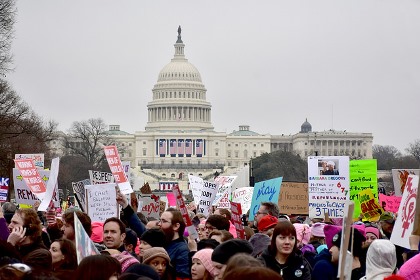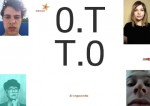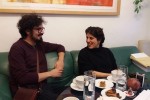
We need to become more political!
It was a coincidence, that the last network meeting concerning the project ’’Art and Games“ coincided with the inauguration of the new president of the United States of America, Donald Trump. These two events that seem to have nothing to do with each other, however, made me think about cultural education in the light of global power shifts.
After all, the 20th January 2017 marks a turning point in global history, which has already gained a series of twists in the events of recent years. With the presidency of an unscrupulous businessman without any political experience, global history showed its new face right in the center of the so-called “free world.”
The network meeting took place above the city roofs of Stuttgart, at the Robert Bosh Foundation, far away from the difficulties of the world. The project itself, which aims to strengthen and further expand access to early childhood educational activities in partnership with cultural institutions, began by imagining a world formed by the various potentials of children and not by an unpredictable, narcissistic businessman.
At the network meeting, the participants shared their experiences not just with the children in cultural institutions, but also with refugees, and they tried out methods to gain self-awareness and self confidence in a completely insecure world as well.
We can no longer keep the growing disorder in the world separated from the field of cultural education. Possible threatening scenarios that have found expression with the figure of Trump are growing closer to our everyday lives and force us to develop an opinion and attitude towards them.
From ‘’Yes, we can!“ to “Yes, I will!“
Eight years ago Barack Obama’s slogan “Yes we can!“ was combined with the hope to gain the optimism of the people for improving their opportunities in life in a global sense. What is left? The political commentators draw a diverse picture about Obama’s presidency. The most enduring point of criticism lies in the fact that he did not manage to convince the majority of his citizens to adopt an attitude that would have rendered the election of this successor impossible.
The election of Donald Trump as the 45th president of the United States of America marks the end of the political domination of liberal democracy in the Western world. Already in his first speech, Trump made clear what he thinks about the liberal-democratic achievements of the last years. With his slogan “America first!“ it is to be expected, that he will do his utmost to enforce his power. The interpretation of his often deliberately ambiguous statements indicate that he is ready to join alliances with other authoritarian regimes that have found a powerful counterpart in the Western world thus far.
Suddenly, Europe is largely unprepared for this new alliance of anti-democratic powers, ranging from China and Russia, Turkey and the southern Mediterranean Europeans countries to the U.S. Even within the European Union there are forces aiming for national isolation.
“Trump tries to destroy Europe“
Whereas the U.S. had been a former liberator of fascist policy in Europe and helped the continent in building up its future on the ground of liberal democracy, it is now on the verge of changing sides and becoming a partner of an authoritarian, illiberal Russia with the intention to shatter the fundamental values of the European Union. Or with the words of Karl Aiginger, former director of the Austrian Institute of Economic Research: “Trump is trying to destroy Europe.“
When worrying about the political, economic and social conditions in Europe, we easily forget about the fact that Europe is still the main economic power in the world with its 500 million inhabitants. Shattering the economic hegemony of Europe seems to be the first intention of the new president, and he is ready to call established diplomatic alliances into question. (His statements on the NATO becoming obsolete are a clear indication of this).
This, however—and we do not dare let ourselves think about it—this means a lasting threat to the European peace project, which in a new geopolitical constellation, will be faced with at least three fronts of political opponents. The European Union must take note of its fact and the fact that the tried and tested post-war order is being brought to its grave.
A wave of illiberal nationalism will spread over Europe
There is little evidence that Europe, the only remaining haven of liberalism, will be able to have a lasting effect on the world affairs. Instead, the Europeans have also experienced a revival of nationalist and anti-democratic forces, which increasingly determine the political agenda of the old continent. We must note painfully that in the course of the post-war optimism, it was not possible to finally eliminate the spirit of an illiberal authoritarianism. It was just kept silent during an extraordinary phase of economic prosperity.
As a reminder: In the late 1990s, the members of the European Council were able to agree on sanctions against governmental participation of the Austrian party FPÖ, although they were largely ineffective. Today, the same functionaries seem to accept the presence of political phenomena like Berlusconi as well as a series of illiberal regimes, whether with Orbán in Hungary or Kaczy?ski in Poland. On the other hand, the political situation in countries like Bulgaria or Romania has completely disappeared from public interest. And now politicians like Le Pen, Wilders, Strache, and Grillo are only waiting to cooperate with Trump. Theresa May is a forerunner for the threatening to break up the European Union, which is on the verge of losing its legitimacy as a political hope-bearer in a majority of the European citizens.
Following this analysis, we have to consider the fact that our living conditions would already begin deteriorating permanently within a short time. Formulated in a personal way, we can no longer assume that our living conditions will improve steadily. Despite the enormous increase in social wealth (and in collective knowledge), there is currently no indication of a combined increase in collective optimism. Instead we see the opposite: We are facing hard times and are required to develop new forms of resistance to the expected further fractures of hard-earned democratic achievements.
And it is not the fault of the refugees – like some illiberal and right-wing political forces try to pervert in the public discourse. Like the former Austrian chancellor Alfred Gusenbauer said in his ten theses concerning Trump‘s inauguration, it‘s not the migration movements which endanger the European project of democracy but the new relations of global political power, which will sooner or later affect our thinking and actions. Whoever is following the reports of the bad conditions for refugees in Belgrade has to recognize that no such conspiracy is committed by those people.
It is often the growing gap between the elites and the so-called “ordinary people“ that is used as an explanation for these developments. However, it is no longer the “wealthy“ whose resources could make an effect on social equality that are under suspicion, but those who rely on the continuance of liberal forms of social coexistence based on diversity and democratic interest and conflict resolution. They are increasingly accused of betraying partial, national interests (“America first!”) above all democratic achievements.
About betrayal and changing sides
According to Didier Eribon’s book “Return to Rheims”, for example, the reorganization of these conditions consists above all in the collapse of the relationship between the “ordinary“ people and their former leaders. Eribon makes it clear that in all of us there is a desire for separation based on class, which would easily expresses itself in racist or otherwise hostile attacks. Throughout the development of proletarian parties (and thus of the political interests of the “oppressed” and “exploited” – when did these terms appear at last in the public discussion?), their leaders had been successful in disciplining their followers and making such resentments impossible. With the betrayal of the socialist parties, their protagonists like Gerhard Schröder, Tony Blair or Francois Hollande had sold the interests of their supporters to the capitalist mainstream and its primacy of competition and unconditional enforcement. The values ??of a proletarian counterculture were left behind. Instead, they have paved the way for the reservations about solidarity and humanity.
The consequences are reflected in the growing invitation of authoritarian political forces to those who experience disadvantages by the current capitalist developments, as a way to show their anger by way of lashing out against those who are even suffering more under the economic, social, and global inequalities, including refugees from the different war-torn areas in the world. In the current process of political and populist self-surrender (for example, in the form of announcing the denial of access, asylum, or social benefits), they are blamed for the deterioration of living conditions by an increasing number of people. And an increasing number of people are willing to participate in this process of de-solidarization and to vote for people like Trump, because of the lack of politically convincing alternatives.
While the political climate is changing fundamentally, we continue to implement projects such as “Art and Games”, which aim to ensure children with access to cultural activities.
Is there nothing more important?
So far we have been able to refuse to ask ourselves that question, focusing instead on the joy and the fun with which the children are involved in cultural activities. Considering the new political circumstances, we have to ask ourselves whether, and if so, which cultural education programs can contribute to the maintenance of liberal living conditions.
However, the joy and fun of the participants are also constitutive for the success of cultural education. We will all need these positive energies in order to be able to face the increasingly adverse living conditions with confidence. In addition, we are entering into a new discussion group, which is looking for arguments that can give social and cultural relevance to cultural education in times of decreasing liberalism.
“We need to become more political!“
“We need to become more political!“ had been the main slogan of a series of conferences and meetings, that I attended in the past weeks.
I have to admit that because of the almost apolitical, if not anti-political, orientation of the sector all references to the meaning of this slogan is missing. (A circumstance that keeps me suspicious of the fact that cultural education has only a very modest critical potential and instead affirms the existing conditions).
Rather than forming the necessary conceptual foundations, I will just give a few indications that could help to realize the common process and need to develop political claims: on the one hand, there are all the attempts to undermine the growing separations between those who benefit from the liberal constitution and those who think they have to suffer. We all deserve an “equal treatment”. This also includes questions concerning the use of attributions such as “less educated,” which can very easily stigmatize someone, and limit their ability to take an active part in a liberal society. Instead, it would be necessary to show an unbiased and comprehensive interest in the living conditions of those who perceive the representatives of cultural education – mostly coming from a middle or high class – as far away from their own social background.
This also applies particularly to our relationship to refugees. The colleagues of Refugium have impressively reported on the difficult survival conditions of refugees at the network meeting of “Art and Games”. They also made it clear how important it is to those parties concerned to leave their status as “refugees” behind and simply to be treated as “normal people” who have something to tell like we do.
The contradiction in the perception of human beings in their respective situations can be transferred to the entire field of cultural education: Cultural education represents its own field with specific qualifications, methods, goals and outcome expectations. But it is also true that this field is embedded in (social) political conditions, with which it interacts in many different ways.
Looking for new (cultural) political forms of resistance
The crucial question may sound pathetic and yet it is irrefutable: Does cultural education have anything to say in terms of the global political paradigm shift? If it is not possible to find good arguments for the relevance of the field of cultural education for the maintenance of a liberal and democratic social order, the voices against the need of such fields will become stronger. And it will not be the voices who share concern about the maintenance of values, which have given Europe a desirable future for the past 50 years.
History does not repeat itself; but we should not forget about the fact that history is full of examples of the instrumentalization of cultural education in authoritarian regimes.
LATEST POSTS
- Art, Culture and Borders – Why boundaries are necessary for a thriving coexistence
- Hype about Chat GPT
- The Autonomy of Art
- About the Value of Art
- Our Jobs are no Longer Our Lives
- It’s Me, Your Non-Visitor
- Quality in the Cultural Sector
- Another Non-word of the Year: ArtandCulture
- On the creeping deflation of culture
- Help, they took away our audience!


